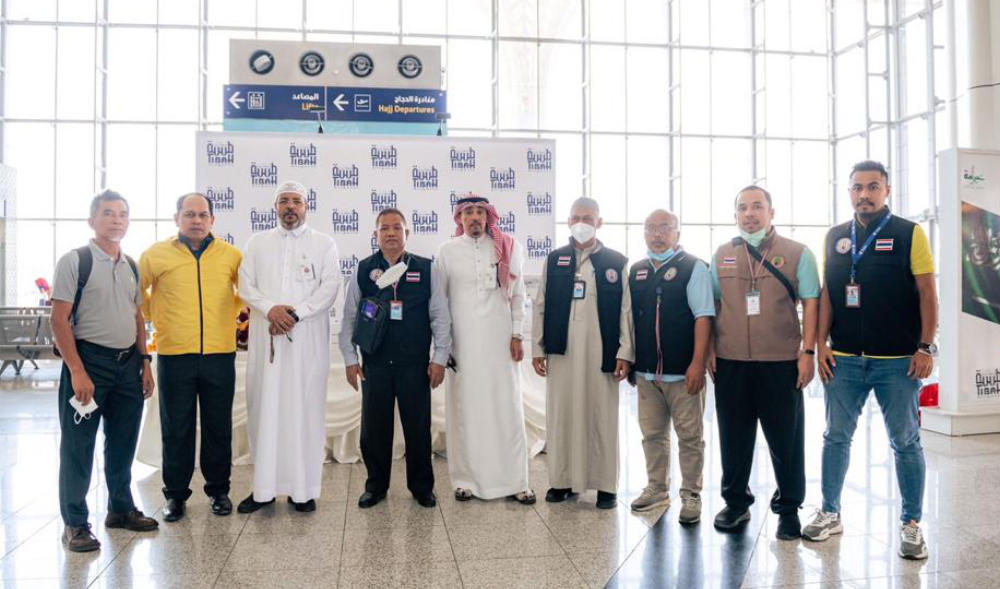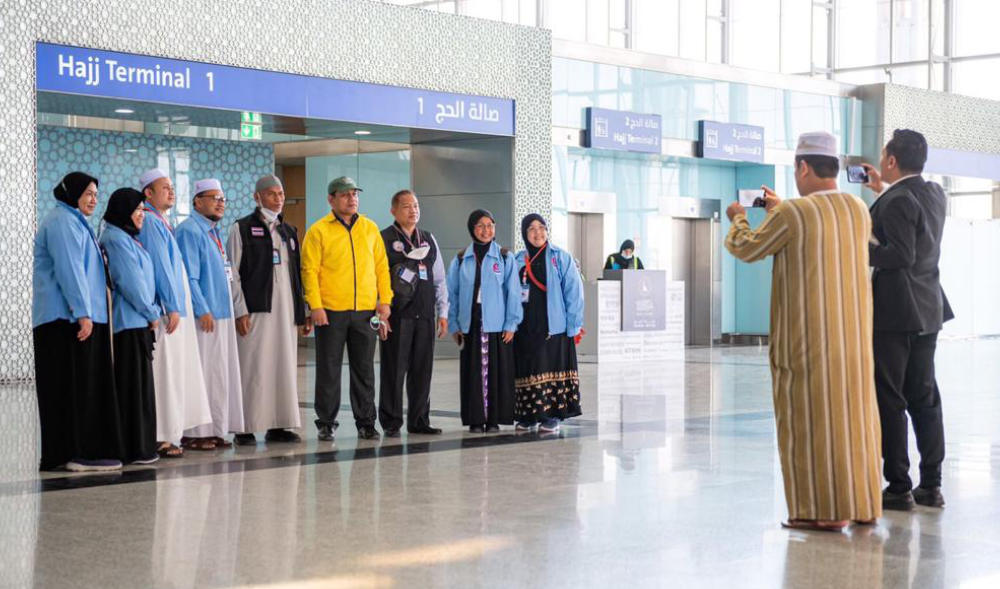RIYADH: Two Thai pilgrims performing Hajj for the first time have expressed their joy at arriving in Saudi Arabia after not being able to do so because of the COVID-19 pandemic.
“Hajj is the opportunity of a lifetime for me. I could not hold back the tears when I saw the Kaaba for the first time. If I am able to perform Hajj after this time, I intend to perform Umrah every year, God willing. Hajj means everything to me,” Arong Samae told Arab News.
Samae from Narathiwat Province, located in the south of Thailand, is a businessman who is undertaking the pilgrimage with his wife this year.
“I seize this opportunity to express my heartfelt thanks to the government of the Custodian of the Two Holy Mosques for its gigantic efforts by which Muslims can visit the city of the Prophet (Madinah) and Makkah once again, and I pray to God Almighty to grant it more prosperity and progress,” said Samae.
The Narathiwat Province native took a plane from southern Thailand to Madinah Airport directly. He arrived in Saudi Arabia on June 11 and left for Makkah on June 17.
“I have never encountered any difficulties; everything is organized and easy. The Thai Hajj Company supplies everything from start to finish, and the Thai government also provides support and facilities at all stages,” Samae said.
“The trip took approximately eight hours by chartered flight, and I did not expect these facilities, because I heard that the pilgrimage journey is tiring and long, starting with car transfers to the capital, then waiting for the flight for two or three days,” he said.
Samae was surprised to see how quick and seamless the process was: “Thank God, everything (was) easy … Less than 12 hours … and I was in Saudi Arabia, I thank God for that,” he said.
“I prayed to God that one day I would arrive in Saudi Arabia. I also thank everyone who serves the pilgrims, whether they are from Thailand or from Saudi Arabia,” he said.
He said that he wanted to perform Hajj two years ago but was unable to because of COVID-19 restrictions. The pandemic had “changed everything” they wanted to do, he said.
Thai native, 58-year-old Mamu Kayah, is performing Hajj with his wife this year. He is a high school Arabic teacher from Yala, a city in the south of the country.
“I am very pleased to have this opportunity, and I thank God day and night for that. And I am absolutely certain that every Muslim who has come to this pure land shares this feeling with me,” Kayah said.
He told Arab News that this was his third time performing Hajj.
“We are very fortunate to have a direct flight from the far south of Thailand, the state of Narathiwat, which is only a hundred kilometers away from my home,” he said.
“The Thai Hajj company and the Thai Hajj mission did their duty well; everything is organized and tidy, especially with the presence of electronic platforms that contribute greatly to facilitating the procedures from the first day until we boarded the plane to Madinah,” he said.
Kayah took a direct eight-hour flight from Narathiwat to Madinah’s Prince Mohammed bin Abdulaziz International Airport. He thanked the Kingdom and Thailand for providing these routes for pilgrims.
“I heard that organizing the chartered plane was not easy, and it can only be done with the tremendous efforts of the two countries, Thailand and Saudi Arabia,” he said.
Kayah and his wife arrived in Madinah on June 12, traveled to Makkah on June 18, and will return to their home country on July 20.
“It can be said that Hajj this year is very special and completely different from my previous experience,” he said.
“For example, from when I got off the plane at Madinah Airport to my arrival at the hotel, the process took only one hour. Every step is fast and tidy, starting with the procedures in the passports, taking the luggage, riding the bus,” Kayah added.
He added that Saudi and Thai employees were available everywhere to assist. “Above all, the reception from the competent Saudi authority was very wonderful; we felt like one of the VIPs,” he said.
It was an emotional experience for him. “Indescribable pleasure, especially for a person of my age. I always cry when I stand in front of the Prophet’s Mosque and the Holy Kaaba, crying for joy, of course, and it is all thanks to God Almighty,” he said.
“The only issue that worries me and everyone is the high prices of everything; in any case, we understand very well that this thing is not in our hands, so that not only the costs of Hajj increased but in everything and all over the world. Other than that, there are no difficulties,” he said.
Thailand has a post-pandemic quota of 5,885 pilgrims, according to the Thai Embassy in Jeddah, with 3,738 having registered to do so. Before the COVID-19 restrictions, Thailand had a quota of 13,000. In 2018 and 2019, a total of 7,851 and 8,462 pilgrims respectively performed Hajj.
As of June 20, 1,120 pilgrims had arrived in Madinah on Thai Airways charter flights. Four flights arrived in the Kingdom from June 10 to 13. The other 2,618 pilgrims will travel on eight flights from June 29 to Jeddah, five of which are through Thai airways and three are with Saudi Airlines.
As the first groups of pilgrims arrived in Makkah and Madinah on Sunday, Basri Tatif, the deputy head of the Thai Pilgrims Affairs, praised the Kingdom for its organization, and said that his fellow citizens will be able to perform their rituals safely with all the measures in place.




























